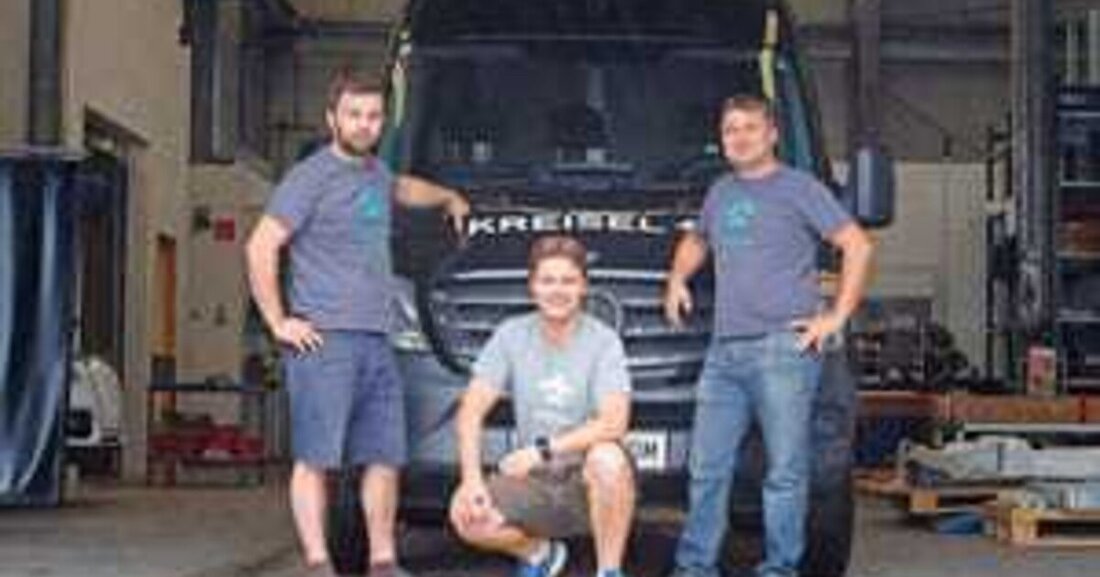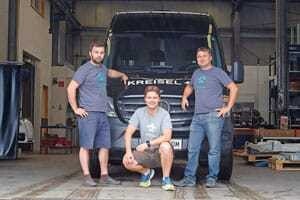Three brothers under power
The Kreisel brothers from Freistadt are building their first electric car for fun. Shortly afterwards, they developed a revolutionary battery technology and founded an electric car company. Their latest coup: an electric Porsche Panamera that easily outpaces its petrol brothers.

Three brothers under power

Markus Kreisel speaks almost as fast as a dictaphone with the fast forward button pressed. A pace that matches the rapid rise that the young electric car manufacturer Kreisel Electric is currently experiencing. It all started at the end of 2012, when the Christmas business for televisions, computers and game consoles was booming at the Freistadt family business Red Zac Kreisel GmbH. After work, the three brothers Johann, Markus and Philipp Kreisel indulge in their new hobby, stripping an old Audi A2 of the engine, transmission and exhaust system, installing the electric motor, battery pack, inverter and control electronics - done. After just seven evenings of tinkering, the small car runs on electricity instead of gasoline. “It was surprisingly easy, so we immediately set our sights on something bigger,” says Markus Kreisel. So next project: Porsche 911 Carrera S. This time with the best electric drive components you can buy. The Kreisel brothers invested their savings, a total of 150,000 euros. The project is a success, with an acceleration of 5.9 seconds from 0 to 100, the E-Porsche is on par with its petrol brothers, but is significantly more economical and quieter. It also breaks several e-mobility records: 50 kilograms lighter than the original, an impressive 400 kilometer range and a full charge time of just 2.5 hours. Suddenly the trio of hobbyists, who were initially ridiculed, are taken seriously and the first customer orders arrive. The brothers founded a company, Kreisel Electric GmbH. The fact that the E-Porsche later burns down can no longer damage the good reputation of the electricity pioneers. A cable from the original 12-volt on-board electrical system broke, sparked and set the car on fire. Luckily, the insurance company covered the damage; the electric drive of the rotary couldn't do anything about it. “We learned a lot from this fire,” says Markus Kreisel. He is a trained businessman, brother Johann is an electronics and communications technician, brother Philipp is a mechanical engineering technician - the ideal mix of skills, garnished with a good dose of entrepreneurial spirit. Additional experts are taken on board; today a total of ten employees work at Kreisel-Electric. No academics, just skilled workers with a lot of practical experience.
Environmentally friendly local transport
After two more successful projects - the electrification of a VW Beetle convertible and a BMW 3 Series Touring - the Kreisel brothers are enthusiastically throwing themselves into the local transport revolution. “I commute 22 kilometers every day through a beautiful landscape to the company – that’s where the idea came to me,” says Markus Kreisel. The electric car pioneers are taking on a VW Caddy, then a Mercedes Sprinter. The result: With 350 km (Caddy) and 300 km (Sprinter), they exceed the range of similar vehicles such as Renault Kangoo Z.E. or Nissan NV200 is twice as fast, and refueling with electricity is around four times as fast as its competitors. How they managed to do this is of course a closely guarded company secret, but Markus Kreisel at least reveals a small part of it. “We use similar battery cells to Tesla, but we connect them with a laser welding process we developed.” In the vehicle, the batteries are heated or cooled as required using a liquid medium. This increases the range on hot summer or cold winter days as well as the lifespan of the cells. The Kreisels therefore guarantee a battery life of 250,000 kilometers with at least 80 percent remaining capacity for Caddy and Sprinter. Two batteries are installed in the Sprinter, including the housing, battery management and electronics, their weight adds up to 500 kilograms. “The combustion engine is no longer needed,” says Markus Kreisel, pointing out the additional 1.5 cubic meters of storage space under the hood of the Sprinter.
Production start in 2016
“The first electric Caddys and Sprinters will roll off the assembly line in 2016,” promise the Freistadt electric pioneers. They are currently negotiating license production with both the VW Group and Daimler AG, but do not want to give away their know-how. “We already have enough orders today and can convert the vehicles on our own,” says Markus Kreisel. The brothers have already purchased a 10,000 square meter property for a workshop, research laboratory and production, and 70 employees will soon be hired. “The OEMs have to make a decision by the end of 2015, and we will definitely get started at the beginning of 2016,” says Kreisel. The price for a Sprinter will be between 70,000 and 100,000 euros, depending on the equipment, while the Caddy comes in at 45,000 to 60,000 euros. “With a service life of six years and a daily mileage of 200 kilometers, you save a total of around 45,000 euros in fuel costs with the E-Sprinter,” calculates Markus Kreisel. In addition, thanks to the low-maintenance and low-wear electric drive, there is a service cost saving of around 9,000 euros, and the federal government's climate active fund is currently granting 20,000 euros in funding if the e-Sprinter is operated exclusively with green electricity - the bottom line is that e-mobility is almost free of charge. However, it wouldn't be the Kreisel brothers if they were satisfied with what they had achieved. They have recently increased the power density of their patented battery again and are currently offering the lightest battery pack at 4.1 kg per kWh.
The three electrified brothers are also obsessed with the topic of e-sports cars. Their current masterpiece is an electric Porsche Panamera 4S with a range of 450 kilometers, 500 hp engine power, a torque of 770 Nm and a top speed of 300 km/h, which easily outpaces its petrol brothers.

 Suche
Suche
 Mein Konto
Mein Konto